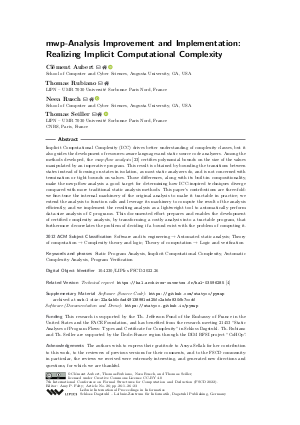@InProceedings{aubert_et_al:LIPIcs.FSCD.2022.26,
author = {Aubert, Cl\'{e}ment and Rubiano, Thomas and Rusch, Neea and Seiller, Thomas},
title = {{mwp-Analysis Improvement and Implementation: Realizing Implicit Computational Complexity}},
booktitle = {7th International Conference on Formal Structures for Computation and Deduction (FSCD 2022)},
pages = {26:1--26:23},
series = {Leibniz International Proceedings in Informatics (LIPIcs)},
ISBN = {978-3-95977-233-4},
ISSN = {1868-8969},
year = {2022},
volume = {228},
editor = {Felty, Amy P.},
publisher = {Schloss Dagstuhl -- Leibniz-Zentrum f{\"u}r Informatik},
address = {Dagstuhl, Germany},
URL = {https://drops.dagstuhl.de/entities/document/10.4230/LIPIcs.FSCD.2022.26},
URN = {urn:nbn:de:0030-drops-163071},
doi = {10.4230/LIPIcs.FSCD.2022.26},
annote = {Keywords: Static Program Analysis, Implicit Computational Complexity, Automatic Complexity Analysis, Program Verification}
}

 Creative Commons Attribution 4.0 International license
Creative Commons Attribution 4.0 International license


